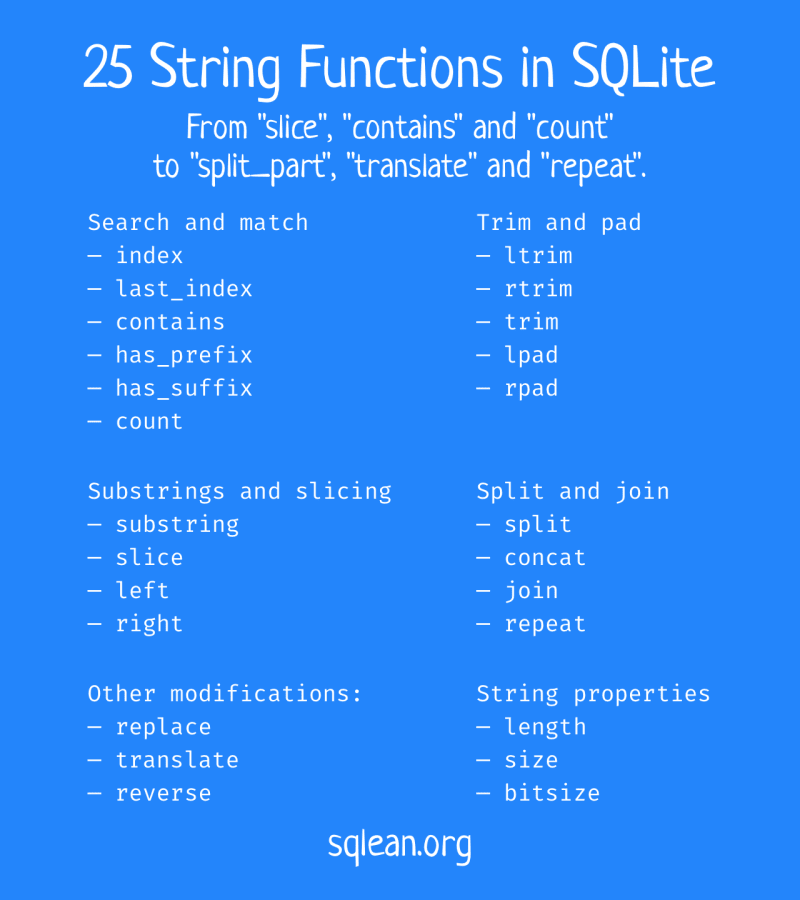
Anton Zhiyanov
Posted on June 8, 2023

SQLite includes basic text functions like instr, substr and replace (and even trim in later versions), which can get you quite far. But I've always wanted a more complete set, like the one in PostgreSQL, Python or Go.
So I've created a sqlean-text extension that provides 25 string functions, from slice, contains and count to split_part, translate and repeat.
Note. Unlike other DBMS, adding extensions to SQLite is a breeze. Download a file, run one database command — and you are good to go.
Many functions are postgres-compatible (i.e. they have the same alias and logic as in PostgreSQL). It can be useful when migrating from SQLite to PostgreSQL or vice versa.
SQLite already has some text functions, but working with a full set is much nicer.
Note that some unicode-related functions like upper and lower are in the separate unicode extension. Regular expression functions are in the separate regexp extension.
Substrings and slicing
text_substring(str, start [,length])
Extracts a substring of length characters starting at the start position.
text_slice(str, start [,end])
Extracts a substring from the start position inclusive to the end position non-inclusive.
text_left(str, length)
Extracts a substring of length characters from the beginning of the string.
text_right(str, length)
Extracts a substring of length characters from the end of the string.
Search and match
text_index(str, other)
Returns the first index of the other substring in the original string.
text_last_index(str, other)
Returns the last index of the other substring in the original string.
text_contains(str, other)
Checks if the string contains the other substring.
text_has_prefix(str, other)
Checks if the string starts with the other substring.
text_has_suffix(str, other)
Checks if the string ends with the other substring.
text_count(str, other)
Counts how many times the other substring is contained in the original string.
Split and join
text_split(str, sep, n)
Splits a string by a separator and returns the n-th part.
text_concat(str, ...)
Concatenates strings.
text_join(sep, str, ...)
Joins strings using the separator.
text_repeat(str, count)
Concatenates the string to itself a given number of times.
Trim and pad
text_ltrim(str [,chars])
Trims certain characters from the beginning of the string.
text_rtrim(str [,chars])
Trims certain characters from the end of the string.
text_trim(str [,chars])
Trims certain characters from the beginning and end of the string.
text_lpad(str, length [,fill])
Pads the string to the specified length by prepending certain characters.
text_rpad(str, length [,fill])
Pads the string to the specified length by appending certain characters.
Other modifications
text_replace(str, old, new [,count])
Replaces old substrings with new substrings in the original string, but not more than count times.
text_translate(str, from, to)
Replaces each string character that matches a character in the from set with the corresponding character in the to set.
text_reverse(str)
Reverses the order of the characters in the string.
String properties
text_length(str)
Returns the number of characters in the string.
text_size(str)
Returns the number of bytes in the string.
text_bitsize(str)
Returns the number of bits in the string.
Installation and Usage
Download the latest release
Use with SQLite command-line interface:
sqlite> .load ./text
sqlite> select reverse('hello');
See How to Install an Extension for usage with IDE, Python, etc.
See Extension Documentation for reference.
Follow @ohmypy on Twitter to keep up with new posts

Posted on June 8, 2023
Join Our Newsletter. No Spam, Only the good stuff.
Sign up to receive the latest update from our blog.




